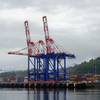Hamburg Süd Reports Sustainably
Hamburg Süd is the first container shipping lines to publish its Sustainability Report in accordance with the Global Reporting Initiative (GRI) G4 Standard Disclosures (Core). Entitled “Setting standards and acting sustainably”, the 84-page report sets out the key topics in the areas of environmental, social and economic responsibility for the 2014 and 2015 reporting period.
“With the new Sustainability Report, Hamburg Süd is once again demonstrating that sustainable conduct is an indispensable part of its corporate philosophy. In compliance with the GRI G4 Standard Disclosures, we are presenting on a voluntary and transparent basis where we stand as regards sustainable behavior,” explains Dr. Ottmar Gast, Chairman of the Executive Board of Hamburg Süd.
In line with the GRI requirement, the choice of topics reported on is based on a survey of relevant internal and external stakeholders of Hamburg Süd, for example customers, employees, media, and associations. In this respect, Hamburg Süd clearly sets itself apart from other sustainability reports within the shipping industry. The derived “materiality matrix” shows among other things that environmental issues are ranked as particularly important. In this area, Hamburg Süd draws a positive balance: “We made significant progress in the reporting period, particularly in terms of our self-imposed environmental target to lower CO2e emissions by 45 percent by 2020,” Dr. Ottmar Gast reports. To date, a minus of almost 35 percent has been achieved compared to the 2009 base year.
Hamburg Süd has also made progress in the equally prioritized areas of water pollution and protection of endangered species, for example by voluntarily exchanging ballast water at sea in all trades and imposing a ban on the transportation of shark fins. In March 2016, Hamburg Süd also joined the “United for Wildlife” initiative.
In addition to a detailed environmental balance, the Sustainability Report also provides information on the current status and developments in the areas of social and economic responsibility. In this connection, the stakeholders surveyed identified aspects such as reliability, data security and occupational health and safety as particularly relevant.












